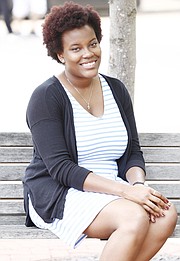Wednesday, January 20, 2016
At first, I was sure I felt a general sense of skepticism in the crowd at Operation Shoestring's "Conversations About Community" at the Jackson Convention Complex in November. The panel discussion, led by WLBT TV personality Maggie Wade, featured local young people instead of well-known business or education leaders, as they often have done in the past at the annual event.
But once the panelists began speaking, everyone seemed to realize, all at once, that we have to listen to our children.
As a member of the much-criticized millennial generation, I'm proud to see younger people like me—teens and 20-somethings—speaking so adamantly about the issues that directly affect them in front of a room full of people who had long graduated, and many of whom probably had children of their own. The conversation included questions about education, such as whether unlimited money could solve education problems in Mississippi, how each panelist's education differed from one another, and the main question, "If everybody cares, why are we 50th?"
Traeshaun Hiley, a junior at Jackson State University, raised a point early on in the conversation that for Mississippi, sometimes there isn't a culture of success within the community. As a whole, we've fallen into the cycle of being OK with doing the minimum to get by and accepting the minimum as someone's best. That is, we don't hold ourselves to high enough standards or believe we can be the best.
I've been guilty of falling into the routine: procrastinate, make an average grade, claim I'll do better, then repeat the pattern. The difference is, I was lucky enough, as a junior and senior at Pearl High School, to have teachers who demanded that I do better.
Panelist Treshika Melvin is a graduate of Harvard University Graduate School of Education and Millsaps College, who as a Jim Hill High School student helped run the Youth Media Project at the Jackson Free Press. She told the crowd that the disconnect is that many people don't realize that schools produce the community.
When I heard this, I was momentarily taken aback by the fact that I never, ever once thought of my education this way.
Melvin's statement reminded me of the group of friends I had when I attended a smaller school before transferring when I was 14. (I use the word "friends" loosely here because it was more an arrangement out of convenience rather than mutual like.) Once I began taking accelerated and honors courses, the like-minded people who were my friends challenged and supported me.
I was never in the same classes past sixth grade. As an eighth grader, I was taking classes such as Ancient Mythology or even Algebra I in a class of sophomores.
It wasn't that I was smarter than any of my friends; my mother's unrelenting desire for me to be more educated than she was (at the time) pushed me to be an AP student. Most of my peers didn't have the support system that I did, nor did they have adequate tools and teachers to succeed. I was nearly a junior in college before I recognized the privilege that I had been afforded.
Today, the like-minded people who are my friends challenge and support me. And thanks to their education and experiences, they give back to their neighborhoods by volunteering or by working in some industry that supports their families, and looking for ways to change their community.
My education shaped my personal community, which makes me wonder about all of those who are left behind by a system that regularly fails them (see the failure of Initiative 42). The quality of my education wasn't the same as those I grew up with, and my experiences differ from those I interact with every day.
Until I got to thinking about it after the Operation Shoestring event, maybe I hadn't recognized the power in privilege, whether checked or unchecked, nor had I ever realized the power in the voices of my generation. I thought that I was doing everything I could by checking "yes" for fully funded education, signing petitions and sharing Facebook posts. But caring, as Treshika Melvin said from the stage at the convention center, is an action verb that requires more than momentary acknowledgments just to be passed off for another cause.
Action requires effort, and effort takes time, people, and funds, and though we say we care about education and our children, our test scores and graduation rates don't show it.
If everybody cares, why are we 50th?
Editorial Assistant Maya Miller is a Jackson State University graduate. She enjoys long walks through Target, running the ever-so popular Netflix marathon and social media.
